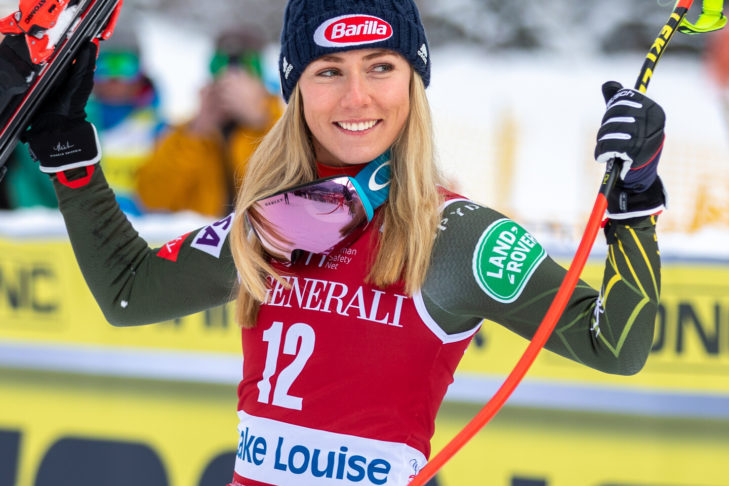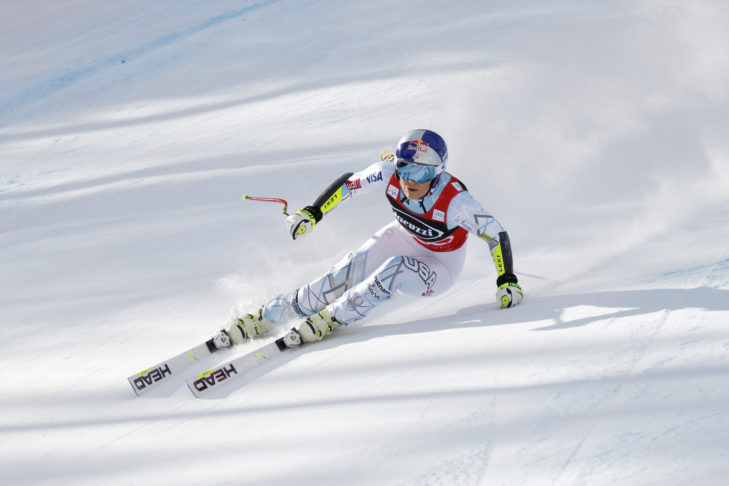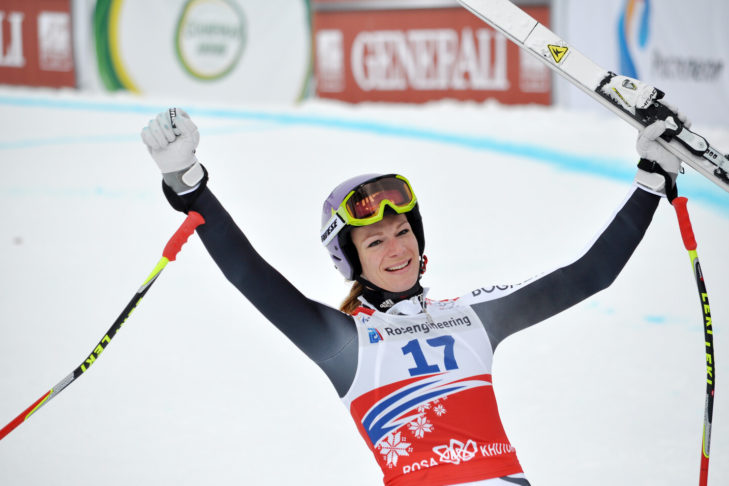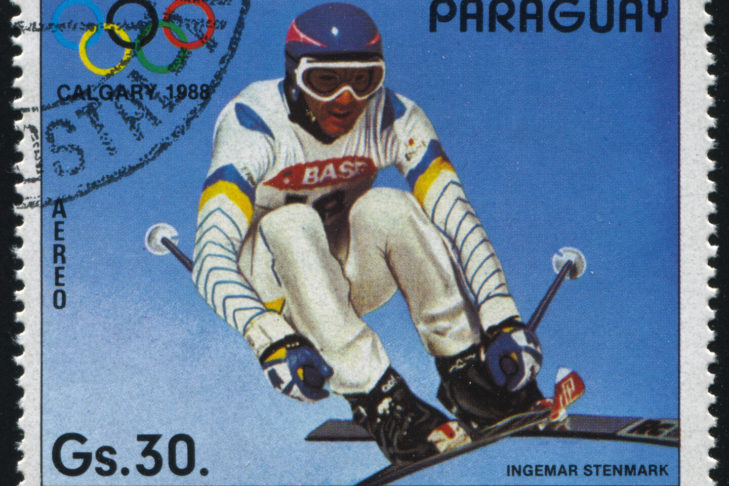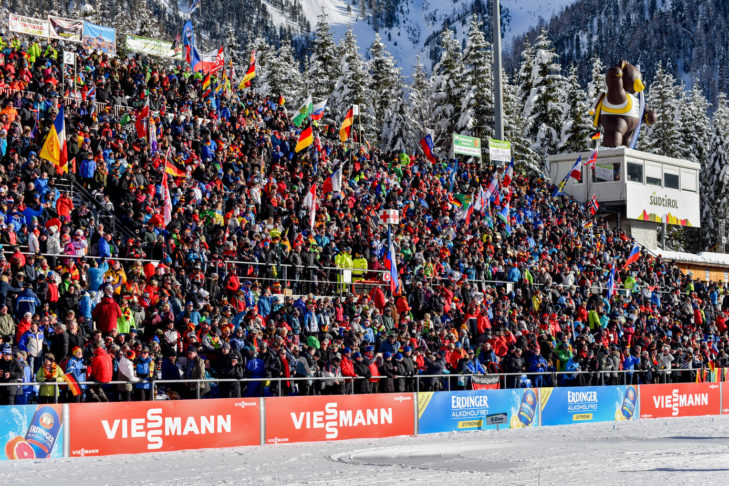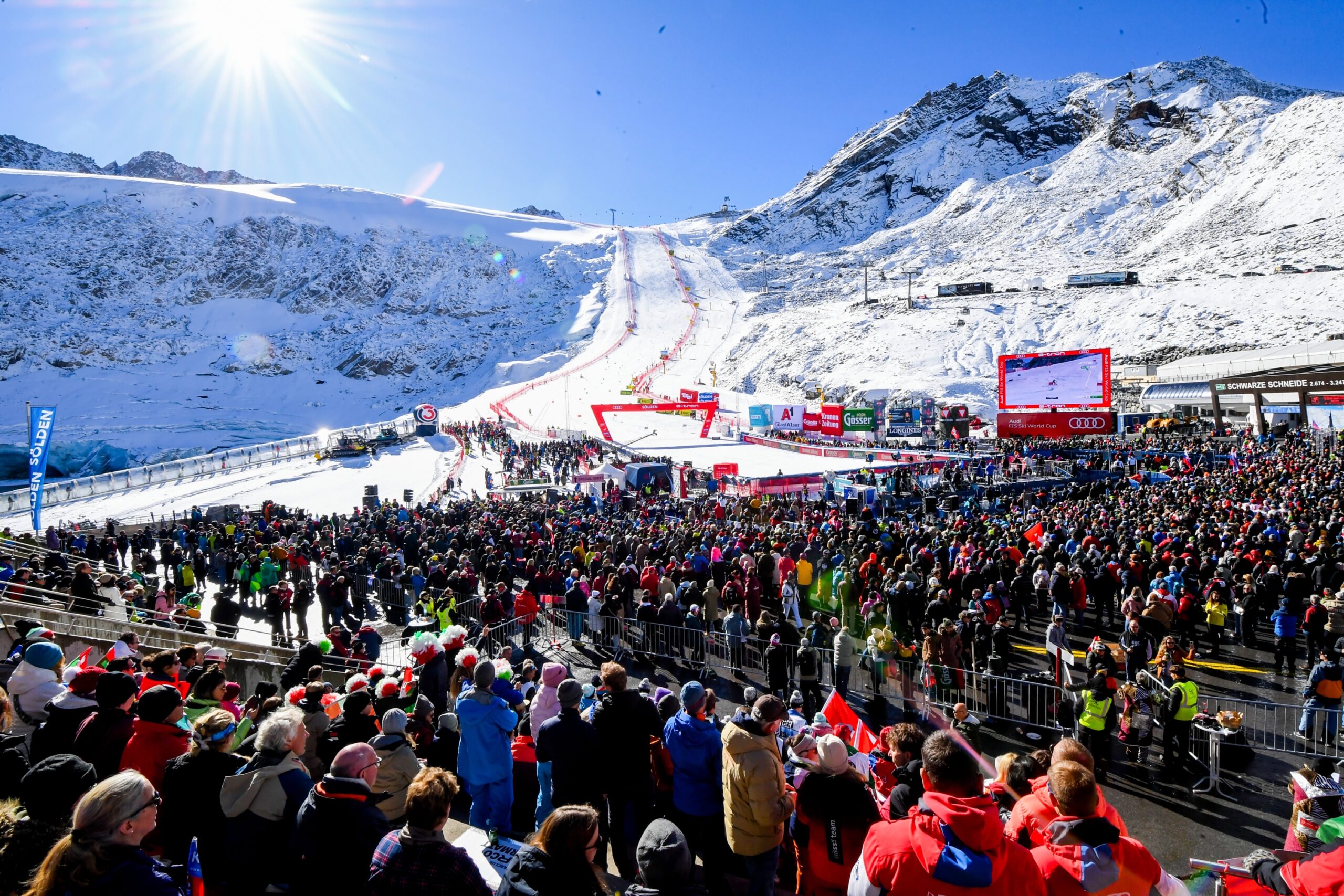Alpine skiing heroes such as Felix Neureuther and Lindsey Vonn, cross-country skier Justyna Kowalczyk, ski jumper Noriaki Kasai and biathlete Magdalena Neuner have left their mark on top international skiing like no other. They are all skiing legends who have not only achieved incredible things in alpine skiing, but also in biathlon, ski jumping and cross-country skiing and have made history in winter sports. So it’s high time for SnowTrex to honour 25 selected athletes and present their achievements.
1. Alpine skiing legends
Franz Klammer
Probably the greatest ski legend of the Austrian skiing nation is Franz Klammer: the former ski racer from Carinthia/Kärnten celebrated a total of 25 downhill victories between 1973 and 1984, including four legendary ski races on the Streif in Kitzbühel alone. He also won the Downhill World Cup five times, making him the most successful racer in this discipline in the history of the Alpine Skiing World Cup. The famous “Carinthia-Franz Klammer” World Cup downhill run in Bad Kleinkirchheim, which has a gradient of up to 35 degrees, is also named after “Kaiser Franz”.
Mikaela Shiffrin
At just 17 years old, Mikaela Shiffrin celebrated her first World Cup victory in December 2012. Initially, the American from Colorado was only successful in her speciality discipline of slalom. She also won her first gold medal in this discipline at the 2014 Winter Games in Sochi, making her the youngest Olympic champion in this competition. Shiffrin also won the world championship title in the same discipline four times in a row between 2013 and 2019. Over the years, however, she has increasingly developed into an absolute all-rounder in the World Cup. With victories in downhill, super-G, giant slalom, slalom, combined and parallel slalom, the ski superstar has already stood at the top of the podium in all Alpine disciplines.
In January 2023, Mikaela Shiffrin celebrated her 83rd World Cup victory at the age of 27 in the giant slalom at Plan de Corones/Kronplatz. With this success, she overtook her compatriot Lindsey Vonn (82 World Cup victories) in the all-time leaderboard and has officially been the best female alpine skier of all time ever since. On 10 March 2023, Shiffrin finally cemented her legendary status in sporting history when she equalled the record of Sweden’s Ingemar Stenmark, the most successful skier of all time to date, with her 86th World Cup victory. And just one day later, the American even claimed her 87th World Cup victory and has been the sole record holder ever since.
Felix Neureuther
Germans also have their own skiing legends: Felix Neureuther from Garmisch-Partenkirchen took his 13th World Cup victory in the slalom in Levi in November 2017. No ski racer from Germany had ever achieved this before him. This also makes the son of slalom specialist Christian Neureuther and double Olympic champion Rosi Mittermaier the most successful German skier in World Cup history before he ended his career in Andorra in March 2019 after the slalom in Soldeu.
Lindsey Vonn
With 82 World Cup victories, Lindsey Vonn has topped the list of the best women’s alpine skiers for years and is therefore also a skiing legend. In total, she has won 20 more races than the ‘world athlete of the 20th century’, the Austrian Annemarie Moser-Pröll. Vonn celebrated her greatest triumph at the 2010 Olympics in Vancouver, when she also became one of the many Olympic skiing idols. There she won bronze in the super-G and gold in the downhill. In the USA, the athlete from the state of Minnesota has achieved the status of a true sports superstar over the course of her career. This also became clear when the broadcasting television station NBC showed an Olympic advert in 2018 during the broadcast of the Super Bowl, the largest single sporting event in the world, which was exclusively focused on Vonn’s career.
Hermann Maier
Austrian Hermann Maier has become a skiing legend not only through his successes, but also through the stories behind them. The most spectacular occurred at the 1998 Winter Olympics in Nagano, when Maier was competing in the downhill race and crashed spectacularly in a bend after just a few seconds of skiing. The fact that he was not injured is still a miracle to this day:
Please also note that by using our services and integrating the YouTube API Services, the YouTube Terms of Service and the YouTube API Services Terms apply and your use of our website is deemed to be acceptance of these terms.
Just as remarkable: just three days later, he won the gold medal in the super-G. Looking back, Maier said at the time that it had taken a lot of effort for him to compete again. But everything went well and he earned his legendary nickname “Herminator”. After two Olympic gold medals, three world championship titles and four victories in the overall World Cup, he ended his career in 2009.
Maria Höfl-Riesch
Three Olympic gold medals, two Alpine World Championship titles, one victory in the overall World Cup: Maria Höfl-Riesch has won almost everything there is to win in her 13-year career as a ski racer. With 27 World Cup victories, the Garmisch-Partenkirchen native is the second most successful German ski racer after Katja Seizinger (36 World Cup victories). However, after Höfl-Riesch led the German team as flag bearer at the 2014 Winter Olympics in Sochi and won her third gold medal there, she retired from professional sport. In the same year, she was honoured with the Silver Laurel Leaf for outstanding sporting achievements by the then German President Joachim Gauck, before being named Germany’s Sportswoman of the Year in December 2014.
Alberto Tomba
Muscular, tan, charismatic and successful: Italian Alberto Tomba was the celebrated pop star among ski racers in the 1980s and 1990s. The eccentric sunny boy and technical specialist from Bologna was repeatedly rumoured to have had affairs and the media hype surrounding him was always huge. However, this was also due to his impressive sporting successes: With 50 World Cup victories as well as three Olympic gold medals and two world championship titles in slalom and giant slalom, he is one of the most successful ski racers of all time.
Marcel Hirscher
Winning the big crystal globe for first place in the overall Alpine World Cup eight times is something no-one has managed before Marcel Hirscher. Why was the Salzburg native so successful? His father Ferdinand, who was head of the Annaberg ski school, simply passed skiing on to him. The Austrian celebrated his first of a total of 67 individual victories in the Alpine Skiing World Cup at the end of 2009 in Val d’Isère. In addition to his dominance in the premier class of skiing, Hirscher also won seven gold medals at the Alpine World Ski Championships. However, one of the most influential ski athletes celebrated his greatest sporting successes at the 2018 Winter Olympics in Pyeongchang. There he won two gold medals in the combined and giant slalom. Away from the piste, Marcel Hirscher is also taking off as a businessman following the end of his career in 2019 and will present his own ski brand in 2021.
Ingemar Stenmark
One of the greatest World Cup skiing legends does not come from an Alpine country, but from Scandinavia. Ingemar Stenmark has won no fewer than 86 World Cups in his career. Away from the piste, the “quiet Swede”, as he was nicknamed, was always very reserved. On the piste, however, he made all the more “noise”. Unlike Franz Klammer, for example, who mainly excelled in the downhill, Stenmark was the king of the technical disciplines. Between 1974 and 1989, he won the giant slalom World Cup a total of 46 times and the small crystal globe in the discipline World Cup seven times. In slalom, he “only” stood at the top of the podium 40 times, but won the discipline World Cup eight times.
The man from Joesjö also won the overall World Cup three times in a row between 1976 and 1979. He also won two Olympic gold medals and became world champion five times. In 1979, Ingemar Stenmark showed just how superior he was to his colleagues in Jasná, Slovakia. There, the Swedish ski icon won the giant slalom with a record lead of 4.06 seconds!
Hannes Schneider
Hannes Schneider, born in 1890, practised his first turns in the snow as a young boy on skis made from old wood and became the first ski instructor on the Arlberg at the age of 17. During the First World War, Schneider served as a ski instructor with the Austrian mountain troops. After the war, he founded the Arlberg ski school in 1921, which is still the oldest ski school in the world today. While the Telemark style was still being taught elsewhere, he and his ski instructors were already teaching the first forerunners of the modern parallel turn, the so-called stem turn. He also introduced the state ski instructor examination and was a co-founder of the important Arlberg-Kandahar race. In 1939, he emigrated to the USA, where he took over a ski school on Mount Cranmore in New Hampshire and helped to build up the ski resort. In the USA, Schneider is therefore still referred to as the ‘Father of American Skiing’ in the 21st century.
2. Biathlon legends
Magdalena Neuner
Even before Magdalena Neuner stepped onto the World Cup stage in 2006, biathlon was very popular in Germany in winter. But with her successes, the Wallgau native has taken her sport to a whole new level. At the 2007 Biathlon World Championships in Antholz, she won her first title at the age of just 19. By 2011, Neuner had won eleven more World Championship gold medals, making her the record biathlon world champion to this day. With 47 World Cup victories (including 13 in the relay), three triumphs in the overall World Cup and two Olympic victories at the 2010 Winter Games in Vancouver, the Bavarian is a true winter sports idol, and not just in her home country.
After retiring from active top-level sport in March 2012, Magdalena Neuner worked as a TV pundit for a time and now lives with her family in the Garmisch-Partenkirchen region. In Neuner’s home town of Wallgau, a panoramic hiking trail and the cross-country ski trail near her parents’ house were named after the three-time Sportswoman of the Year (2007, 2011 and 2012).
Ole Einar Bjørndalen
It is no coincidence that Ole Einar Bjørndalen is still considered the “King of the Biathlon”. After all, he won an incredible 94 individual and 41 relay victories in the Biathlon World Cup between 1996 and 2017! And the bare figures show just how important the Norwegian is in the biathlon and why he is considered one of the greatest winter sportsmen of all time. Bjørndalen has won 13 medals at five Olympic Winter Games (eight of them gold), 45 medals at biathlon world championships (20 of them gold) and the overall World Cup six times. But that’s not all. In November 2006, the exceptional athlete from Drammen even celebrated a World Cup victory in cross-country skiing in Gällivare, Sweden. This made him the first male winter sportsman to achieve this feat in two different sports.
Laura Dahlmeier
After the retirement of Magdalena Neuner, fans did not have to wait long for the next German biathlon superstar. In March 2013, Laura Dahlmeier completed her first World Cup race at the legendary Holmenkollen in Oslo after an outstanding performance at junior level. It was the start of an extraordinary career, which the Garmisch-Partenkirchen native ended just six years later at the age of 25 to devote herself to studying sports science and her other passions, mountaineering and mountain running.
For one thing, Dahlmeier wanted to retire from the limelight; for another, she had actually won everything there was to win in the biathlon at this point. In addition to 20 individual and 13 relay successes in the World Cup, she also won the World Team Challenge in the “Auf Schalke” arena together with Florian Graf in 2013. However, the 2017 overall World Cup winner celebrated her greatest success a year later in Pyeongchang. At the 2018 Winter Olympics, Laura Dahlmeier won gold in the sprint and pursuit. However, her performances at the 2017 Biathlon World Championships in Hochfilzen were the most impressive, at least in terms of performance. There, she won three gold medals and one silver in four individual races. The German women’s relay team and the German mixed relay team also won two more world championship titles
Martin Fourcade
Dominating. This is probably the most accurate way to describe Martin Fourcade’s biathlon career. Because between 14 March 2010 and exactly the same day ten years later, the Frenchman won 79 individual World Cup races, coming closer to Ole Einar Bjørndalen’s record than any other athlete before him. What the man from the south of France has ahead of the ‘King of the Biathlon’, however, is the number of overall World Cup victories. With seven, he is just ahead of the Norwegian (6). It is also unique that Fourcade won these titles in a row between 2012 and 2018. But his successes at the World Championships and Winter Olympics also make him a true winter sports legend.
In addition to 13 World Championship titles, there are also five Olympic gold medals in the trophy cabinet at the home of the father of three in Villard-de-Lans. In his declaration of retirement in 2020, Martin Fourcade, who repeatedly took a critical look at the issue of doping in elite sport during his active career, emphasised his intention to remain active in sports politics in the future.
Magdalena Forsberg
The most successful athlete in the history of the Biathlon World Cup is Magdalena Forsberg. Between 1997 and 2002, the Swede dominated the competitions between the cross-country track and the shooting range almost at will. Forsberg stood at the top of the podium a total of 42 times in her career, winning the overall World Cup six times. She also won 17 small crystal globes in the discipline World Cup rankings. A mark that is still unrivalled in women’s biathlon today. She has always had the Ruhpolding biathlon guru Wolfgang Pichler at her side as her coach. And while Magdalena Forsberg was denied Olympic gold until the end of her career in 2002, she won a total of twelve medals (six of them gold) at six biathlon world championships.
However, the former cross-country skier won her first ever World Championship medal in 1987 at the Nordic World Ski Championships in Oberstdorf with the relay team. What makes Forsberg’s achievements even more remarkable is the fact that, due to the lack of sports funding in Sweden at the time, she still worked part-time as a tax consultant to earn enough money.
3. Ski jumping legends
Michael “Eddie the Eagle” Edwards
Michael Edwards may be the worst ski jumper of all time. He only wanted to compete in the Olympic Games for his home country, England. A goal that he achieved in Calgary in 1988, when the talentless, unambitious ski jumper became the first British ski jumper to travel to the Olympics. However, with a jump of 71 metres, he finished in last place and was made the “laughing stock of the nation” by the press. But Eddie’s childhood dream came true, following the motto “It’s not winning but taking part that counts the most”. He was nicknamed “Eddie the Eagle” and became a cult figure in England despite his poor sporting achievements.
His incredible story was captured in 2016 with the film “Eddie the Eagle”. Starring Taron Egerton, Hugh Jackman and Christopher Walken:
Please also note that by using our services and integrating the YouTube API Services, the YouTube Terms of Service and the YouTube API Services Terms apply and your use of our website is deemed to be acceptance of these terms.
Kamil Stoch
Ski jumper Kamil Stoch is now regarded as the legitimate successor to Polish skiing hero Adam Małysz. In the mid-1990s, his duels against Martin Schmitt and the associated successes in the World Cup and at the Nordic World Ski Championships triggered a veritable ski jumping boom in his home country. And Stoch capitalised on it. After his World Cup debut in 2005, it took almost six years before he was able to celebrate his first individual success. And of course he did so in Poland’s ‘ski jumping capital’ and his birthplace of Zakopane. This victory was ultimately to become one of dozens of major successes for the Pole. For example, Sven Hannawald set a record in Bischofshofen in 2001 when he became the first ski jumper ever to win all four competitions of the Four Hills Tournament, a feat that the ski jumping superstar from the High Tatras only broke 17 years later.
Stoch then repeated this hitherto unique “Grand Slam” in 2018/2019 as the second athlete ever to do so, winning the second of his three Tour titles to date. With two overall World Cup victories, three Olympic gold medals, two World Championship titles and the successes in the Four Hills Tournament, Kamil Stoch is also one of only five ski jumpers who have triumphed in the four most important competitions in their sport. The other four from this illustrious circle are Espen Bredesen, Thomas Morgenstern, Matti Nykänen and Jens Weißflog.
Jan Boklöv
Without Jan Boklöv, ski jumping would not be what it is today. After all, he is considered the inventor of the V-style jump technique. According to his own statement, he was “forced” to do it by chance during a training jump in 1985. It was only by splitting his skis apart in the air that the Swede was able to avoid a serious fall in Falun. In the competition, Boklöv used his newly discovered technique immediately and, thanks to the lift he gained, sometimes sailed up to 20 metres further than his competitors.
They initially continued to jump in the classic parallel technique. However, despite his successful technique, Boklöv repeatedly was deducted style points. Nevertheless, as a five-time individual World Cup winner and overall World Cup winner in 1989, he was so successful that his style became established. One day, the ski jumping committee also recognised that greater distances were possible with the V-style, so that it officially and finally replaced the parallel jump technique in 1990.
Noriaki Kasai
Japan’s Noriaki Kasai is the undisputed marathon man among winter sports athletes. Believe it or not, at the incredible age of 51 he qualified for another World Cup competition in February 2024. In his home country, of course, on the Olympic ski jump in Sapporo. He first qualified for a World Cup there in 1992 at the tender age of 16. In total, Kasai has ‘only’ won 17 World Cups and one World Ski Flying Championship title in more than three decades as a professional ski jumper. However, he has set various age and participation records that will probably never be broken again. Noriaki Kasai competed in 570 World Cups in 32 World Cup seasons, became the oldest participant ever to win a World Cup competition at the age of 42 years and 176 days, and also took part in the Four Hills Tournament 28 times and the Winter Olympics eight times between 1992 and 2018:
Please also note that by using our services and integrating the YouTube API Services, the YouTube Terms of Service and the YouTube API Services Terms apply and your use of our website is deemed to be acceptance of these terms.
Sven Hannawald
When ski jumpers were celebrated like pop stars in Germany in the early 2000s, Sven Hannawald was right in the thick of it. After his first individual success at the Ski Jumping World Cup in Bischofshofen in January 1998, it took a while before today’s TV pundit cracked the legend of the Four Hills Tournament exactly four years later to the day. After Hannawald had already won the competitions in Oberstdorf, Garmisch-Partenkirchen and Innsbruck in the 2001/2002 season, he triumphed for the second time on 6 January 2002 at the Dreikönigsspringen. This made him the first ski jumper in history to achieve the “Grand Slam” of the tour.
And although Hannawald did not manage to win the overall World Cup in his career, he is now one of the most successful ski jumpers from Germany and a true winter sports legend. In addition to two gold medals each at the Nordic World Ski Championships and the Ski Flying World Championships, the man from the Black Forest also won the Olympic team ski jumping title in Salt Lake City in 2002 together with Stephan Hocke, Martin Schmitt and Michael Uhrmann.
4. Cross-country skiing legends
Justyna Kowalczyk
For years, she was the figurehead of Polish cross-country skiing: Justyna Kowalczyk. She was the first Polish woman to win an Olympic medal in cross-country skiing and also won the overall World Cup not once, but four times. Kowalczyk is also the sole record winner of the Tour de Ski with four overall victories. And as a two-time Olympic champion (2010 and 2014), she is one of the most successful Polish cross-country skiers in sporting history. Her run in Sochi 2014 became legendary when, despite a broken bone in her foot, she bravely mastered the 10 km race in classic style and won Olympic gold in spring-like temperatures:
Please also note that by using our services and integrating the YouTube API Services, the YouTube Terms of Service and the YouTube API Services Terms apply and your use of our website is deemed to be acceptance of these terms.
Bjørn Dæhlie
The 10 km classic technique cross-country race at the 1998 Winter Olympics in Nagano went down in history for two reasons. Firstly, because Bjørn Dæhlie won his hitherto unrivalled sixth gold medal at the Winter Games, thus cementing his status as the best cross-country skier of all time. Secondly, because of the performance of the Kenyan Philip Boit. As his country’s first Winter Olympian, he was of course hopelessly inferior in the cross-country skiing. He finished 92nd and therefore last, over 20 minutes behind the winner. But a truly Olympic moment occurred just a few seconds later. Instead of collecting his medal, Dæhlie was the only athlete to remain in the finish area. Receiving the Kenyan in person was ultimately more than just a sign of respect for him.
The two have been good friends ever since, and Boit even named his son Daehlie after the winter sports legend. For the Norwegian himself, the victory in Nagano was the highlight of a career that is still unrivalled today. He won a total of eight gold medals in cross-country skiing at three Winter Games. At the Nordic World Ski Championships, the Norwegian national hero even won the title nine times. And in the Cross-Country World Cup, the six-time overall World Cup winner stood at the top of the podium 46 times in individual races between 1989 and 1999.
Tobias Angerer
Nobody expected that a cross-country skier from Germany would make history in the most Nordic of all sports at the turn of the year 2006/2007. After all, the highlight of the World Cup season at the time was the first Tour de Ski. And the overall winner of the race, which consists of several stages like the famous Tour de France, was actually Tobias Angerer in the end. After his compatriots René Sommerfeldt (2004) and Axel Teichmann (2005) had won the overall World Cup, Angerer continued the German series with his triumphs in 2006 and 2007. With 16 World Cup victories (individual and relay) as well as six silver and five bronze medals at the World Championships and Winter Olympics, the Bavarian is now one of Germany’s best-known ski athletes.
Marit Bjørgen
The unofficial title of the best female cross-country skier of all time goes to the motherland of this sport, namely Marit Bjørgen. By the time she retired in 2018, the Norwegian had won a total of 15 Olympic medals. This makes her the most successful Winter Olympian in history. Bjørgen celebrated the last two of her eight Olympic victories in 2018 Pyeongchang over 30 km and with the Norwegian women’s relay team:
Please also note that by using our services and integrating the YouTube API Services, the YouTube Terms of Service and the YouTube API Services Terms apply and your use of our website is deemed to be acceptance of these terms.
In addition to an overall victory at the Tour de Ski (2015), the trained sprinter also achieved four triumphs in the overall World Cup (2005, 2006, 2012 and 2015). And nobody has been as successful as Marit Bjørgen in the premier class of cross-country skiing – not even amongst the men. She has stood on the podium an incredible 220 times in the World Cup, 114 of them in the individual competition. And the Norwegian was also successful with the team (sprint and relay) 30 times.
Dario Cologna
The Tour de Ski was his thing. No one has ever won the overall men’s title as often as Dario Cologna. The Swiss skier also took the yellow jersey at the end of the final climb up the Alpe Cermis four times. The record Tour winner was born in Münstertal, Graubünden, in 1986 and started alpine skiing at the age of five. At the age of 13, he switched from the piste to cross-country skiing and became the best cross-country skier in Switzerland until his retirement in 2022. In the World Cup, Cologna won 15 individual races and the overall World Cup four times. He also won his only World Championship title in the skiathlon at the 2013 Nordic World Ski Championships in Val di Fiemme.
In 2010 (in Vancouver), 2014 (in Sochi) and 2018 (in Pyeongchang), the man from Münstertal also emphasised his special motivation for the Winter Olympics. He won a total of four gold medals for Switzerland. In recognition of his achievements, the Rhaetian Railway in Switzerland named one of its trains “Dario Cologna” in 2010. And the municipality of Tschierv, near his birthplace, named a street after the winter sports legend.
FAQ’s on winter sports legends
Who is the best German skier of all time?
With 13 victories in individual World Cup races, Felix Neureuther is the best German skier in this category. However, he is outdone by two compatriots. Katja Seizinger (36 World Cup victories) and Maria Höfl-Riesch (27 World Cup victories) not only have more than twice as many racing successes to their name, but with two (Seizinger) and one (Höfl-Riesch) major crystal globes, they are also the only two German female Alpine skiing overall World Cup winners to date.
Who is the most successful Austrian skier?
Marcel Hirscher has won an incredible eight overall Alpine Skiing World Cup victories in his career. This makes him not only Austria’s most successful skier, but also one of the most successful skiers of all time. With six large crystal globes in her trophy cabinet, Hirscher’s compatriot Annemarie Moser-Pröll can still call herself the most successful female ski racer in the world in this field.
Who is the best skier from Switzerland?
The best Swiss skier is Pirmin Zurbrüggen. In addition to four overall World Cup victories in Alpine skiing, he won a total of 40 World Cup races between 1980 and 1990, eleven small crystal globes in the discipline World Cup, four gold medals at the World Ski Championships and one Olympic gold medal in 1988. The most successful Swiss female ski racer is still Verni Schneider, who won the overall Alpine World Cup three times.
Who has won the most downhill races?
American Lindsey Vonn has won the most downhill races in the history of the Alpine Ski World Cup. She has stood on the top step of the podium 43 times in this discipline. With 36 downhill victories, Austria’s Annemarie Moser-Pröll is in second place on the all-time list. Ahead of her compatriot Franz Klammer, who has 25 victories in the fastest discipline in alpine skiing, including four in the legendary Hahnenkamm downhill in Kitzbühel alone.
Who is the best ski jumper in the world?
Sara Takanashi from Japan (2012/13, 2013/14, 2015/16 and 2016/17), the Adam Małysz from Poland (2000/01, 2001/02, 2002/03 and 2006/07) and Matti Nykänen from Finland (1982/83, 1984/85, 1985/86 and 1987/88) have the most overall World Cup victories in ski jumping with four each. They are therefore regarded as the best ski jumpers in the world. In contrast, the Austrian Gregor Schlierenzauer has won the most individual victories in the World Cup, having stood atop the podium 53 times.


